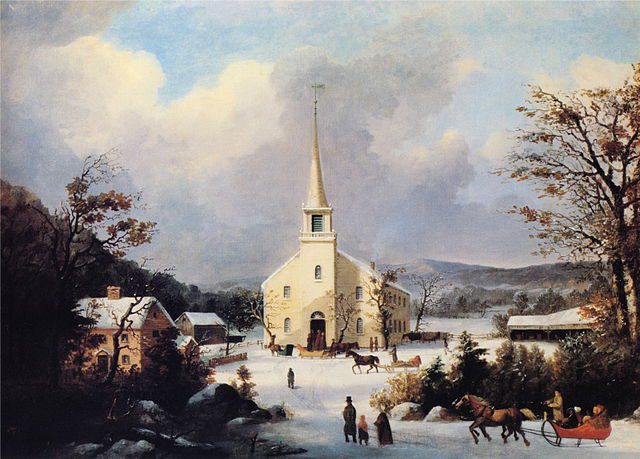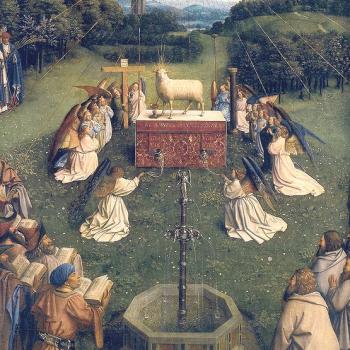
Taylor D. Barrett is a Catholic, who commented underneath an article of mine on this topic. This is my response. His words will be in blue.
*****
Enjoy the blog,
Thanks!
but this one always gets me. Coming from a Protestant Evangelical background, the Sunday Obligation just seems to extraordinarily legalistic. Reading St. John Chrysostom’s commentary on Galatians 5 right now, where he comments that Christ profits you nothing if you get circumcised because getting circumcised means you fear the law and do not trust grace, and if you do not trust grace you cannot benefit from it. Now, of course, in context the Law is the Mosaic Law.
Yes; that is the important thing to note there. We are no longer bound to the entire Mosaic Law. It doesn’t follow, however, that we are bound to no rules or laws or “regulations” at all.
But I fight the idea that there is a spiritual principle here, that if you’re trying to do some good thing out of fear that you will not be saved if you don’t, then you are not trusting grace. Therefore, doing the good deed of going to Mass on Sunday out of fear that you won’t be saved if you don’t could be seen as a lack of trust in grace, and if that’s the case, then such a posture would make Christ of no effect in our lives.
I would deny the premise and note that it seems to me that most serious Catholics are not going to Mass every Sunday in abject fear of mortal sin or losing their salvation (i.e., as their primary or main reason), but rather, because they love it; they want to go, and understand the joy and necessity of regular assembly with other believers and receiving Our Lord in the Holy Eucharist, which gives us all sort of power and sustenance to face the trials and challenges of life.
I agree that if a person is only going because it’s required, out of some foolish sense of legalism-only, that it would be improper and blameworthy, and would definitely be indicative of a dim understanding of what the Catholic Christian life is about. On the other hand, they deserve credit for at least going in the first place, rather than not going at all. More on that below . . .
Now, I realize the response to this is probably that we must avoid sin out of fear we will not be saved, and therefore, there is not some general principle about not doing things out of fear we won’t be saved. But it seems to me there is a difference between avoiding doing evil in order to remain in grace and thinking one must do good in order to be saved. I guess the only response would be that in the case of circumcision, the Law has been fulfilled and is not a requirement, so therefore, trying to obey it is a contradiction of the Gospel which fulfilled it…. while, in regards the Sunday obligation, to miss without reason would be to deliberately forsake an opportunity for communion with Christ, which could definitely be seen as an evil action: although I would probably classify it more as foolish and/or lazy rather than evil/sinful .
Though some would probably question if there is any difference between those categories, I think there is some difference between neglecting what’s good and deliberately doing what’s evil. At least, a degree of difference. Anyways, I am trying to fully embrace the grace of God and trust in Him completely for the free gift of mercy and salvation that comes to us through faith, but these “hang-ups” seem to get in the way. Or maybe I am just deceived on the issue and there is absolutely nothing contradictory about believing in the Sunday obligation as a potential mortal sin and completely trusting in the free gift of grace for salvation. May Christ help me. Amen.
I think you are hitting upon the main point at the end: “there is absolutely nothing contradictory about believing in the Sunday obligation as a potential mortal sin and completely trusting in the free gift of grace for salvation.” That’s a true statement. We can all fall into legalism (or the opposite error of license and antinomianism): being human and sinful. But as we advance in the Christian life we have to progress beyond that.
I think you’re approaching it in the wrong way; from a flawed perspective. The Mass obligation is not about rules, but about “spiritual normalcy” or “spiritual bare minimum obligations.” The Christian needs to worship with fellow believers, as a good and helpful thing:
Hebrews 10:24-25 (RSV) and let us consider how to stir up one another to love and good works, [25] not neglecting to meet together, as is the habit of some, but encouraging one another, and all the more as you see the Day drawing near. (“classic” KJV rendering: “Not forsaking the assembling of ourselves together”)
Acts 20:7 On the first day of the week, when we were gathered together to break bread, . . .
Acts 12:12 When he realized this, he went to the house of Mary, the mother of John whose other name was Mark, where many were gathered together and were praying.
Acts 13:44 The next sabbath almost the whole city gathered together to hear the word of God.
Acts 14:27 And when they arrived, they gathered the church together and declared all that God had done with them, and how he had opened a door of faith to the Gentiles. (cf. 15:6, 30)
Psalm 102:22 when peoples gather together, and kingdoms, to worship the LORD.
It’s fundamental to Christianity (and its precursor, Judaism) to gather together to worship the Lord, and to engage in liturgy, rite, and ritual. It’s plain in Scripture that this is a good and worthy and spiritually helpful thing.
All the Church is saying is that it is so important that it should be made obligatory for the Catholic who has voluntarily submitted to the authority of the Church. We make things mandatory because of their importance. If you want to get married, you have to do it the proper way, by the rules, and in front of the Church community. You don’t just run off and proclaim yourselves married, because the traditional ritual is supposedly “legalistic” and implies a mere fear of losing salvation if someone doesn’t do it.
No! We do it the right way because that’s how the Church has determined that it ought to be done. No one is going through a wedding ceremony thinking that they would be guilty of mortal sin if they hadn’t done it (in this case, fornication); rather, they are joyfully experiencing it, in all its glorious meaning and significance. It’s the same with the Mass.
Those who are spiritually weak and in an elementary stage of learning may think it is a drudgery to drag themselves out of bed every Sunday to attend because, well, they “have” to. Those who have advanced and understand the faith beyond a primitive stage will joyfully, voluntarily do it.
But the law and the obligation is there for those who are weak, because human nature requires rules before it can properly understand a willing and voluntary spirit, because something is good to do. That’s why we have lots of rules for children, because they are too young to make wise choices. The older they get, the less rules are necessary, or else they “self-supervise.”
It seems to me that you may be struggling with scrupulosity. Just a hunch . . . but if not, that does account for many struggles among those who have that tendency: with the whole aspect of “legalism” and rules and commitments, etc.: wondering whether we are condemned and whether God is constantly “after” us. That’s not how biblical or Catholic faith works. It’s simply one particular psychological outlook that brings about such anxiety, rather than the essence of how rules and laws function in a religious context.
The following related remarks of mine were written in January 2008. They were in response to the comments of a Protestant seriously considering Catholicism. First I had written:
Like many Catholic things, this is widely misunderstood as yet another legalistic burden, whereas Church attendance ought to be seen as a privilege and joy, and as an extension of the OT Sabbath principle.
I think it’s one of those things that Protestants object to that show they have too much time on their hands, along with. e.g., crucifixes: “those goofy Catholics are meditating on Jesus dying for us???!!! We can’t have that!” Carping on and on about compulsory church attendance seems to me to be another huge non-issue.
This person took issue with my characterization and stated that legalism was indeed a serious problem to address and that “there is a difference between doing something because we are told and doing something because it’s a response of love ” and “my response to the Mass is first an act of love and faith. If it’s simply an obligation, then my heart has not found it’s hope. It is a ritual with no meaning other than a symbol.” I replied in turn:
I agree with virtually all of what you wrote.
The thing I would note in this regard is that not all Christians, by a long shot, are motivated out of sheer love for the Lord and desire to please Him and to lead a saintly life. In fact, I would argue that this lamentable deficiency is true most of the time for everyone, no matter how pious or devout. We tend to “coast” in our spiritual life and not to make a positive effort to be all that we can be, so to speak.
The Church in her wisdom, recognizes this, and so makes something compulsory, lest this tendency to laxity cause many to not attend church. Is that a good thing all in all or a bad one? Is it a “net gain”? Of course it is good. It’s better to have someone be in Church, even though they are not perfectly motivated from the heart and soul, than not to be there, and sitting at home watching the Sunday morning news shows.
It’s another “both/and” scenario: I don’t have to disagree with you about the ideals of the Christian life: wholehearted service to God and completely pure motivation: doing everything for the right reasons, by God’s grace. I also don’t have to quibble with the Church’s wisdom in requiring church attendance, for the sake of those Christians who are merely “coasting” in their spiritual life, going through the motions without much heart or interior motivation.
Both are good. We all should strive for the ideal, and pray for God’s grace to achieve it, but we should also be glad that many a Joe Q. Catholic is in the pews even though he is there because he has to be there, not because he wants to be. God in His mercy accepts millions of His followers (at the “spiritual milk” stage) as they are, warts and all.
Related reading:
Why Is It a Mortal sin to Miss Mass? (Fr. Ray Ryland, This Rock, July 2000)
Forget Mass? Not a Mortal Sin (Karl Keating, This Rock, Nov. 2003)
FAQ About Sunday Obligation: Not Going to Mass (Catholic Doors Ministries)
Sunday Obligation (Jimmy Akin)
Fulfilling the Sunday Obligation on Saturday [+ Part Two] (Jimmy Akin)
***
Photo credit: Going to Church (1853), by George Henry Durrie (1820-1863) [public domain / Wikimedia Commons]
***












